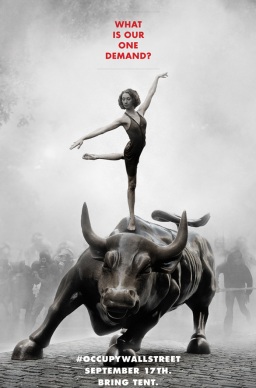
I have been following the Occupy Wall Street (OWS) protest in New York. I am generally supportive of their aims – to bring awareness of the increasing inequality in America. Additionally, I feel there is a great deal of pent up anger at Wall Street for their contribution to the massive economic chaos of 2008 and the Global Financial Crisis. It not only seemed like those responsible were never taken to justice for their actions, but in many cases they just got richer while being bailed out by tax payers. I am angry that the moral hazard of their risk taking was never addressed.
They were not the only ones of course. The mortgage industry, the credit rating agencies, certain mortgage applicants, and the government all failed together. The impact is still being felt, for example in the on-going Euro crisis.
The contagion that started on Wall Street quickly spread to Europe, through the English banks and the over-leveraged banks in countries like Iceland.
It is true that the taxpayer bailouts included the very same bankers – they pay taxes too. However, as the OWS movement has brought up, the top earners (like the Wall Street financiers) often pay a lower tax rate than their secretaries. This idea spawned the “We are the 99%” movement.
Power in the US resides in the wealth class. The Senators and Representatives and Presidents are typically millionaires. The power of the ultra-wealthy, with few limits to their political contributions, has increased dramatically. Even corporations, thanks to the second-worst Supreme Court decision, can contribute with no limits to political campaigns.
The poor are not being represented. Even the middle class is less and less empowered, despite contributing the majority of the tax base for the US. It’s almost like taxation without representation.
I admit that I don’t understand the Occupy protests in other locations, such as Canada. There are protesters here in Ottawa. In Canada, our financial systems and banking are highly regulated and never got into the same sort of risk taking as Wall Street or Canary Wharf. And Ottawa is not even the business centre of Canada – that’s Toronto and Montreal. And in Canada, the tax rate are significantly higher. I think this is a good balance. I pay around 42% in income tax (even more once the 13% harmonized sales tax is included, even though it is not income tax). Although it is a high rate, I think that it provides a more balanced, civil society. It is one of the privileges of living in one of the best countries in the world.
[Updated Nov 25, 2012: The top 1% in Canada took almost a third of all growth in incomes between 1997 and 2007. I am now more understanding of the Occupy protests in Canada. Canada has inequality that could be addressed.]
In the 1950’s, with one of the greatest boom economies, the top tax rate in the US was 85% and rose to 91% by 1960. The same in Britain – the Beatles were paying 95% when George wrote Taxman. Although that rate might be too high, the ultra-wealthy should contribute to the overall common good. Today, the top tax rate for the ultra-wealthy Americans, according to the Internal Revenue Service, is 18%.
Coming back to the 99% protests, I decided to see where I fit in. I know that as a high-tech worker, I am above the Canadian average. I am in the second highest tax bracket. I found a website http://www.globalrichlist.com/ and input my income. I was flabbergasted to discover that I am in the top 0.7% world wide. I am roughly the 40,000,000th richest person in the world. There are 7 billion people in the world. I was stunned. Am I part of the problem? Am I a bad person?
But that’s the world wealth calculator. I found a separate Canadian calculator, http://www2.macleans.ca/2011/10/25/rank-your-income-where-do-you-stand-compared-to-the-rest-of-canada/. I put the same numbers in and found that I drop well out of the top 1% – Canada is a wealthy country overall and is a member of the G7.
It still left me wondering, “I am doing enough”? I think the answer is yes and no.
No, I do not donate as often as I could. I do donate to causes that are important to me, like diabetes research. I give blood. I give to local charities. And I volunteer my time. But I know, especially when I think about the numbers above, that there are many impoverished people in the world. I’ve been to India and other places where the difference between the First World and the rest of the world is stark.
But, Yes, I do feel that I contribute to the common good. I work for a telecommunications company. I am part of the team building network infrastructures that are used by people around the world to communicate. Although not everyone can afford a phone, it is surprising that even in a poor country like India, over 851 million people have mobile phones – that’s over 70% of the population. Access to information and people can increase socioeconomic development everywhere.
In the end, I guess that makes me feel better.
